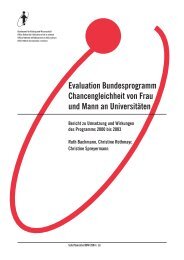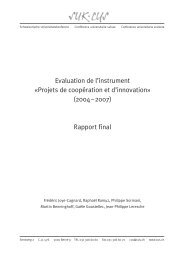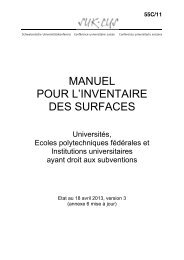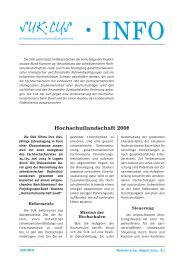Evaluation of the Swiss Virtual Campus - Schweizerische ...
Evaluation of the Swiss Virtual Campus - Schweizerische ...
Evaluation of the Swiss Virtual Campus - Schweizerische ...
You also want an ePaper? Increase the reach of your titles
YUMPU automatically turns print PDFs into web optimized ePapers that Google loves.
SVC Final <strong>Evaluation</strong>. Background Report Lepori and Probst<br />
6 Conclusions<br />
Before coming to some concluding points, it is important to state that one should understand<br />
some limitations <strong>of</strong> this report dictated by its original mandate. Namely, <strong>the</strong> report limits itself to<br />
present <strong>the</strong> views and appreciations <strong>of</strong> <strong>the</strong> SVC coordination unit, <strong>of</strong> <strong>the</strong> directorates <strong>of</strong> <strong>the</strong><br />
higher education institutions and <strong>of</strong> <strong>the</strong> SVC projects, while we disregarded those <strong>of</strong> o<strong>the</strong>r<br />
stakeholders like students (which have been included in <strong>the</strong> expert evaluation). Some biases<br />
might emerge for this reason. At <strong>the</strong> same time, <strong>the</strong> objective <strong>of</strong> this work has been more to<br />
understand <strong>the</strong> overall impact <strong>of</strong> <strong>the</strong> SVC programme on <strong>the</strong> development <strong>of</strong> elearning in <strong>Swiss</strong><br />
higher education, than to measure <strong>the</strong> efficiency <strong>of</strong> spending in an economic sense or to<br />
compare <strong>the</strong> SVC with similar programmes abroad.<br />
If we come back to <strong>the</strong> main questions <strong>of</strong> this evaluation – elearning strategies and CCSP,<br />
sustainability <strong>of</strong> SVC projects, coordination and mandates – we get <strong>the</strong> following overview.<br />
1) Firstly, during <strong>the</strong> SVC programme, most <strong>Swiss</strong> HEIs developed an elearning strategy and<br />
established a support centre which will be fur<strong>the</strong>r continued after <strong>the</strong> end <strong>of</strong> programme. Most<br />
respondents in rectorates and CCSPs are confident in <strong>the</strong> future and stated that responsibility<br />
for elearning can now be fully taken by <strong>the</strong> institutions <strong>the</strong>mselves; <strong>the</strong>y also agreed that in<br />
many cases political pressure, financial support and coaching from <strong>the</strong> SVC gave a strong<br />
impetus to this process. At <strong>the</strong> same time, a number <strong>of</strong> problematic cases emerged where <strong>the</strong><br />
CCSP is still in development or <strong>the</strong> situation is largely unclear.<br />
In our opinion, support and promotion <strong>of</strong> CCSP has been <strong>the</strong> most successful part <strong>of</strong> <strong>the</strong> whole<br />
programme and a solid heritage for <strong>the</strong> future development <strong>of</strong> elearning; also, most institutions<br />
answered positively to this impetus and found well-adapted solutions for <strong>the</strong>ir context. The SVC<br />
cannot be blamed for <strong>the</strong> few cases where, because <strong>of</strong> lack <strong>of</strong> institutional support or <strong>of</strong> difficult<br />
internal or personnel constellations, a CCSP has not yet been established. It remains an open<br />
issue to which extent some kind <strong>of</strong> monitoring and follow-up <strong>of</strong> CCSP should be organised, for<br />
example in <strong>the</strong> framework <strong>of</strong> <strong>the</strong> CRUS, to avoid some institutions losing momentum.<br />
2) Secondly, projects <strong>the</strong>mselves see <strong>the</strong>ir future perspectives as ra<strong>the</strong>r positive and affirm that<br />
<strong>the</strong> developed products are and will be used in education in most cases, even if lack <strong>of</strong> funding<br />
might impair future developments. CCSP and monitoring visits give a more differentiated view,<br />
where <strong>the</strong> projects which are based on standard technical solutions will be maintained, while<br />
more innovative and niche projects will have more difficulties. Overall, both sides see <strong>the</strong><br />
collaboration between projects and CCSP as very positive and well-functioning. It is also stated<br />
that projects will also be used in <strong>the</strong> future by partners and not only by <strong>the</strong> leading house and,<br />
overall, <strong>the</strong> collaboration between different institutions has been judged as positive (even if<br />
resource- and time-consuming).<br />
Our opinion is that it would be incorrect to affirm that most <strong>of</strong> <strong>the</strong> SVC projects will just die after<br />
<strong>the</strong> end <strong>of</strong> federal funding, but that <strong>the</strong>ir outcome might be quite different from that foreseen at<br />
<strong>the</strong> beginning, especially for <strong>the</strong> 1 st and 2 nd series projects which were clearly aimed at<br />
developing fully on-line courses. It is likely that, with <strong>the</strong> exception <strong>of</strong> few projects, in most cases<br />
<strong>the</strong>ir impact will be more in <strong>the</strong> renewal <strong>of</strong> educational practices than in <strong>the</strong> development <strong>of</strong><br />
widely used products and, in this respect, <strong>the</strong> decision to reduce funding levels quite<br />
considerably in <strong>the</strong> 3 rd and 4 th series has been seen as correct.<br />
3) Finally, <strong>the</strong> steering and management <strong>of</strong> <strong>the</strong> programme has been generally appreciated,<br />
while <strong>the</strong> mandates clearly had a lower impact, largely because <strong>of</strong> <strong>the</strong> additional functions<br />
assumed by <strong>the</strong> CCSPs. Especially, <strong>the</strong> choice to establish a national LMS based on a<br />
commercial system revealed itself a posteriori as not adequate because <strong>of</strong> <strong>the</strong> stronger role<br />
assumed by <strong>the</strong> LMS adopted by a CCSP, <strong>of</strong> <strong>the</strong> development <strong>of</strong> open source s<strong>of</strong>tware and<br />
technical problems with <strong>the</strong> adopted system.<br />
Our opinion is that <strong>the</strong>se choices have to be considered in <strong>the</strong> context <strong>of</strong> <strong>the</strong> time when <strong>the</strong>y<br />
were taken, but that it is correct to question if <strong>the</strong> ra<strong>the</strong>r large amount spent for mandates (4<br />
mio. CHF) could not have been spent better. In <strong>the</strong> whole context <strong>of</strong> <strong>the</strong> programme, however,<br />
this seems to us to be a ra<strong>the</strong>r minor point.<br />
55










